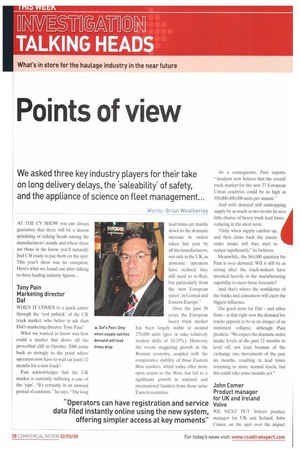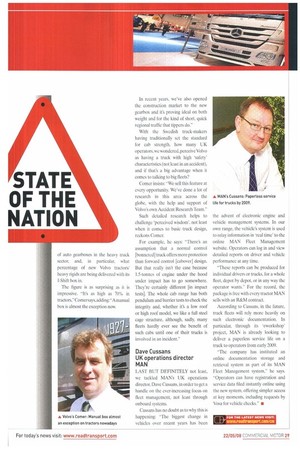Points of view
Page 28

Page 29

If you've noticed an error in this article please click here to report it so we can fix it.
We asked three key industry players for their take on long delivery delays, the 'saleability' of safety, and the appliance of science on fleet management...
Words: Brian Weatherley
AT THE CV SHOW you can always guarantee that there will be a decent sprinkling of talking heads among the manufacturers' stands, and where there are those in the know, you'll naturally find CM ready to put them on the spot. This year's show was no exception. Here's what we found out after talking to three leading industry figures...
Tony Pain Marketing director Oaf WI1EN IT COMES to a quick canter through the 'real politick' of the UK truck market, who better to ask than Daf's marketing director, Tony Pain?
What we wanted to know was how could a market that drove off the proverbial cliff in October 2006 come back so strongly to the point where operators now have to wait (at least) 12 months for a new truck?
Pain acknowledges that the UK market is currently suffering a case of the 'yips'. "It's certainly in an unusual period of contrasts," he says. "The long lead times are mainly down to the dramatic increase in orders taken last year by all the manufacturers, not only in the UK, as domestic operators have realised they still need to re-fleet, but particularly from the new European states', in Central and Eastern Europe."
Over the past 30 years, the European heavy truck market has been largely stable at around 270,000 units (give or take relatively modest shifts of 10-15%). However. the recent staggering growth in the Russian economy, coupled with the comparative stability of those Eastern Bloc markets, which today offer more open access to the West. has led to a significant growth in national and international hauliers from those same Eastern countries. As a consequence, Pain reports: -Analysts now believe that the overall truck market for the new 27 European Union countries could be as high as 350,000-400.000 units per annum."
And with demand still outstripping supply by as much as two to one he sees little chance of heavy truck lead times reducing in the short term.
"Only when supply catches up, and then claws back the excess order intake will they start to reduce significantly," he believes.
Meanwhile, the $64,000 question for Pain is over demand. Will it still be as strong after the truck-makers have invested heavily in the manufacturing capability to meet those forecasts?
And that's where the confidence of the banks and consumers will exert the biggest influence.
The good news for Daf — and other firms — is that right now the demand for trucks appears to be in no danger of an imminent collapse, although Pain predicts: "We expect the dramatic order intake levels of the past 12 months to level off, not least because of the exchange rate movements of the past six months. resulting in lead times returning to more normal levels, but this could take some months yet."
John Comer Product manager for UK and Ireland Volvo WE NEXT PUT Volvo's product manager for UK and Ireland, John Comer, on the spot over the impact
of auto gearboxes in the heavy truck sector, and, in particular. what percentage of new Volvo tractors/ heavy rigids are being delivered with its I-Shift box in.
The figure is as surprising as it is impressive. "It's as high as 70% in tractors," Comersays,adding:"Arnan ual box is almost the exception now. In recent years, we've also opened the construction market to the new gearbox and it's proving ideal on both weight and for the kind of short, quick regional traffic that tippers do."
With the Swedish truck-makers having traditionally set the standard for cab strength, how many UK operators, we wondered, perceive Volvo as having a truck with high 'safety' characteristics (not least in an accident), and if that's a big advantage when it comes to talking to big fleets?
Corner insists: "We sell this feature at every opportunity. We've done a lot of research in this area across the globe, with the help and support of Volvo's own Accident Research Team."
Such detailed research helps to challenge 'perceived wisdom', not least when it comes to basic truck design, reckons Corner.
For example, he says: "There's an assumption that a normal control [bonneted] truck offers more protection than forward control [caboverl design. But that really isn't the case because 1.5-tonnes of engine under the hood under impact has to go somewhere. They're certainly different [in impact tests]. The whole cab range has both pendulum and barrier tests to check the integrity and, whether it's a low roof or high roof model, we like a full steel cage structure, although, sadly, many fleets hardly ever see the benefit of such cabs until one of their trucks is involved in an incident."
Dave Cussans UK operations director MAN LAST BUT DEFINITELY not least, we tackled MAN's UK operations director, Dave Cussans, in order to get a handle on the ever-increasing focus on fleet management, not least through onboard systems.
Cussans has no doubt as to why this is happening; "The biggest change in vehicles over recent years has been the advent of electronic engine and vehicle management systems. In our own range, the vehicle's system is used to relay information in 'real time' to the online MAN Fleet Management website. Operators can log in and view detailed reports on driver and vehicle performance at any time.
"These reports can be produced for individual drivers or trucks, for a whole fleet, depot by depot, or in any way the operator wants." For the record, the package is free with every tractor MAN sells with an R&M contract.
According to Cussans, in the future, truck fleets will rely more heavily on such electronic documentation. In particular, through its `eworkshop' project, MAN is already looking to deliver a paperless service life on a truck to operators from early 2009.
"The company has instituted an online documentation storage and retrieval system as part of its MAN Fleet Management system," he says. "Operators can have registration and service data filed instantly online using the new system, offering simpler access at key moments, including requests by Vosa for vehicle checks." •
r FOR THE LATEST NEWS MIT: rwwifiriloadlransport.cont/cm












































































































































































